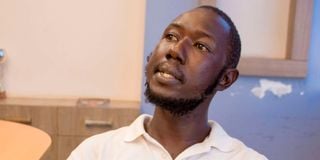‘They said my bipolar was a curse from God for leaving priesthood’

Nicholas Odhiambo during the interview.
What you need to know:
- A diagnosis at Mathari Hospital in Nairobi confirmed his worst fears: bipolar disorder, social anxiety, drug-induced psychosis and severe depression.
As a teenager, Nicholas Odhiambo felt that he had made the right choice.
Being a catholic was something special to him. Now imagine being a priest? His grandmother, who had brought him up as a staunch catholic, tagging him along for masses and church activities, was ecstatic when he declared his interest for priesthood.
“As young as 10 years old, I could envision an older version of myself saying homilies at our local church in Kisumu County while occasionally catching my grandmother’s proud eyes as they followed me from the altar to the pews, ” he said with a grin.
Entering seminary felt like fulfilling a lifelong dream. Yet, with each passing year, a seed of doubt began to sprout.
“I saw people leave. Purity tests. Family politics. For some, they just didn’t fit in. By the fourth year, my once unwavering faith felt riddled with questions. Internal battles raged at night; dreams of a different life clashing with the guilt of straying from his ordained path,” he said.
It was during this time that he was told about a plan to travel to Columbia at the end of their fifth year for a two-year course.
“That was my tipping point. I approached my trainers and explained that I wanted a two year break to re-evaluate my calling, but being one of their most promising seminarians, they were not willing to let me go,” said the 32 year old.
Eight agonising months later, he made the same request. This time, the seminary reluctantly granted him a leave of absence along with a one-way ticket back to Nairobi. By then, Nicholas was already displaying the classic signs of depression — social withdrawal, lethargy and a pervasive sense of hopelessness.
Upon his return, Nicholas, fearing his family’s reaction, delayed going home. He worried about upsetting his grandmother and fraying his bond to the rest of his relatives and everyone who had supported his journey to priesthood. In a desperate attempt to numb the emotional turmoil, he turned to drugs.
Months later, a diagnosis at Mathari Hospital in Nairobi confirmed his worst fears: bipolar disorder, social anxiety, drug-induced psychosis and severe depression.
“I couldn’t continue living alone,” Nicholas recounted. So I went back to Kisumu. Many people, including my guardian, believed this was a punishment from God for leaving the priesthood and it required a religious intervention.”
Some insisted on his return to the seminary as the only path to recovery. “Thankfully, the local priest in Kisumu who seemed to understand the complexities of mental health encouraged my family to seek medical intervention alongside their prayers,” he offered.
The negative environment made the recovery journey more challenging and his psychiatrist advised him to move back to Nairobi, where he could closely monitor him.
Back in Nairobi, his health improved. He would spend most of his time researching mental health clinics and online support groups. He found one and it became his lifeline.
“Through the group, I realised there were dozens facing similar struggles,” Nicholas shared. It helped me identify my triggers, like drugs and stress, and develop coping mechanisms.”
After three years of medication, Nicholas, now a mental health champion, peer educator and mentor, feels a renewed sense of purpose. He visits the health facility for monthly check-ups and has reconciled with his family.
“I also requested for dispensation from the seminary,” he added.
Ms Janetrix Achieng, a psychologist working with the Tinada Youth Organization in Kisumu, emphasised the multifaceted nature of mental health disorders. “Environmental, genetic and physical factors can all contribute,” she explained.
“Cultural and religious beliefs can also significantly impact the recovery process, either positively or negatively.”
She highlighted the dangers of associating mental illness with curses, witchcraft or punishments. “This discourages people from seeking professional help. Those suffering need support and clear pathways to access appropriate treatment.”
She stressed the importance of maximum awareness and education to combat stigma.






